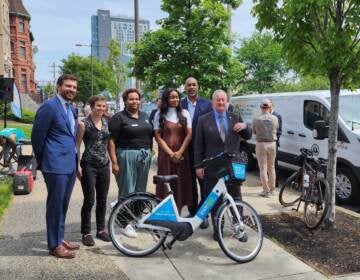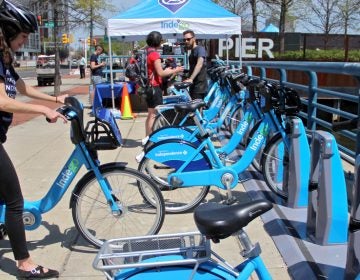Indego to expand, add e-bikes as more people turn to bicycles for transportation
The past year has seen more people turn to cycling as they seek physically distant modes of travel and recreation. Indego is seizing the trend to grow.

An Indego user docks an electric bike. (Indego/Facebook)
Thirty new Indego stations and 300 new electric bikes are coming to Philadelphia’s bike share system in 2021.
The growth marks the first phase of a five-year expansion plan that will more than double the size of the city-supported bike-share program and greatly increase its presence outside of Center City.
The 30 stations coming in 2021 will be in West Philadelphia and parts of South Philadelphia.
Aaron Ritz, Transportation Programs Manager for the Office of Transportation Infrastructure and Sustainability, pointed to West Philadelphia as a specific place of interest.
“The trauma of the past year… have kind of highlighted this is a place that is struggling and has had a deficit in services and we want to be adding Indego as a resource there,” said Ritz.
The past year has also seen more people turn to cycling as they seek physically distant modes of travel and recreation. As the pandemic hit the city nearly a year ago, Indego saw record-high ridership which was likely also influenced by an unusually warm 2019 winter. Through the spring and summer, Philadelphia bike shops reported booming sales, a trend seen nationally as the bicycle industry saw its biggest spike since the oil crisis of the 1970s.
Indego’s five-year plan anticipates the system growing from 1,400 bikes to 3,500, of which half will be electric bikes.
“The role of e-bikes is going to become more and more important as the actual network grows and become geographically larger,” said Kristin Gavin-Wisniewski, General Manager of Indego.
Faster and easier to use, e-bikes have also been shown to increase the diversity of bike share users as they appeal to a wide range of riders. The bikes have also proven popular with thieves, inspiring the city earlier this year to retrofit the fleet to make them harder to steal.
Indego’s five-year plan envisions a network of 350 stations extending into South, West, North, and Northwest Philadelphia, areas that haven’t been as well-served by the network as denser Center City where the system was initially concentrated.
Indego is also seeking community input for new station locations and seeking up to seven Indego Expansion Liaisons to serve as advisers to the program as it expands to several new neighborhoods.
Please come to East Falls, Manayunk / Roxborough. North Philly. West Philly. Your map doesn’t even show half of the city! https://t.co/yjo7f0HAgF pic.twitter.com/ZWeqep1GU2
— Paul Rudd saying “that’s thick” on repeat (@Thecanarium) December 7, 2020
The triangle at West Passyunk, Jackson, and 18th would make a great spot. @WPNAPhilly is this within your boundaries? https://t.co/MJyngvvJT7
— Ian Moody (@IanTMoody) December 7, 2020
The bike models for both electric and classic will remain the same, but the expansion will include new energy-saving stations. The kiosk-less, battery-powered stations require less energy to operate than the solar-powered stations, and the docks enter a “sleep mode” when not in use.
Indego has two testing sites for the stations: one at Broad Street and Cecil B. Moore Avenue and another at Broad and Carpenter streets.
The city recently awarded Indego’s original operator, Bicycle Transit Systems, a 10-year contract to continue running the bike-share system. The agreement is set to begin in January.

Subscribe to PlanPhilly
WHYY is your source for fact-based, in-depth journalism and information. As a nonprofit organization, we rely on financial support from readers like you. Please give today.







